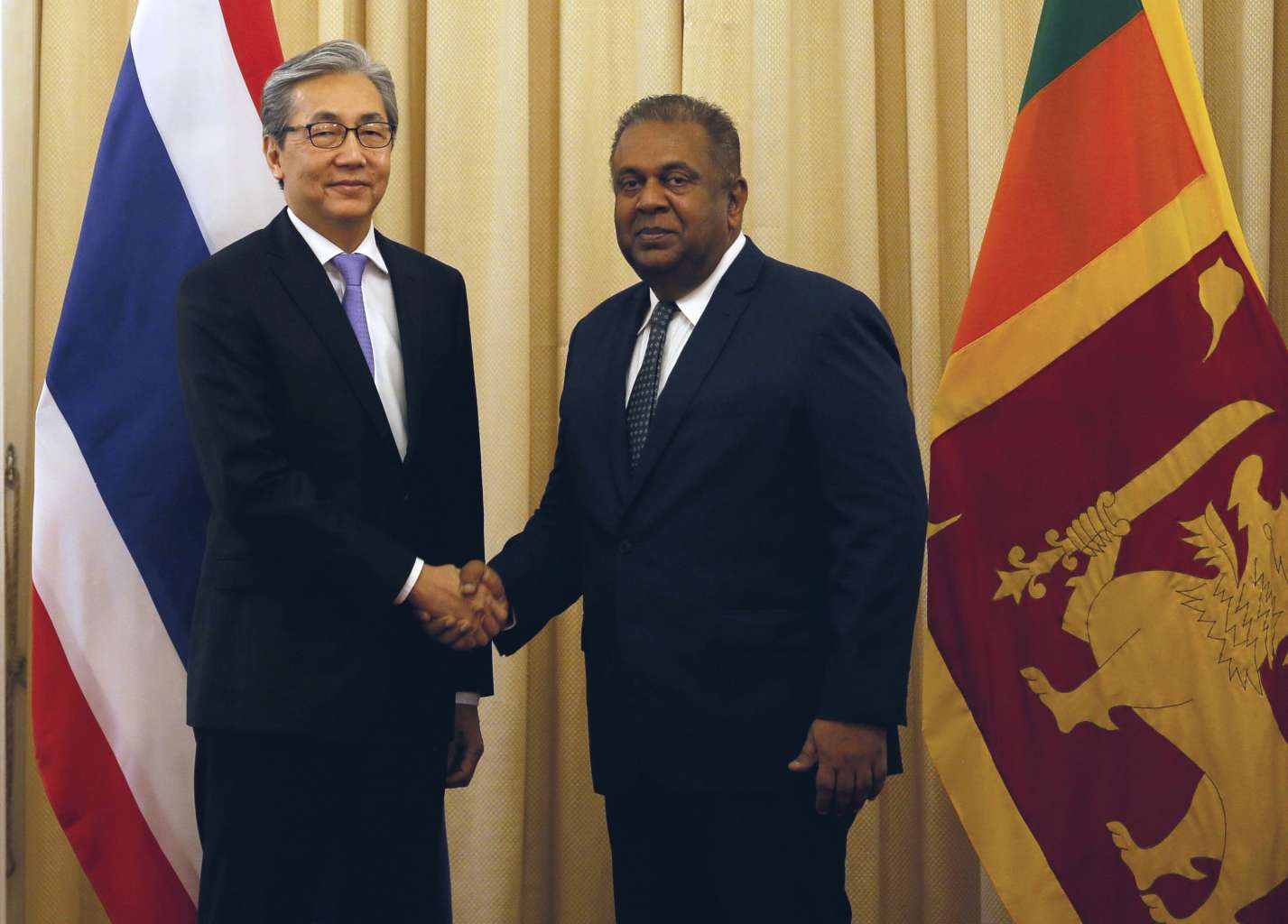THE ASIAN VOICE
Old Bangkok-Colombo axis re-emerging: The Nation columnist
Sign up now: Get insights on Asia's fast-moving developments

Somkid Jatusripitak, Thailand's Deputy Prime Minister (left), shakes hands with Sri Lanka's Foreign Minister Mangala Samaraweera during the bilateral meeting in Sri Lanka, on March 9, 2016.
PHOTO: REUTERS
Follow topic:
Kavi Chongkittavorn
The Nation/Asia News Network
The Nation/Asia News Network
Thailand's relations with Sri Lanka date back to the 12th century when their Buddhist monks travelled across the vast Indian Ocean exchanging Sanskrit scripts and interpretations.
The current Siam Nigaya (sect) of Buddhism is the testimony to a living and long-standing link between the two Buddhist nations.
Moreover, Thais have also been brought up with the mystical place known as Longka, in the Ramayana epic story, which is known over here as Ravanna in the ancient time.
Fast forward to the present day, the Bangkok-Colombo ties have never been better - albeit with ups and downs due mainly to the 25-year civil war inside Sri Lanka.
Notable is that they have not in any way impacted on their bountiful religious ties as well as common strategic links with major powers.
Regular exchanges of visits by senior monks and cross-country Buddhism rituals have gone on unabated.
Better still, the leaders of the Thai armed forces frequently visit Buddhist key sites, gradually transforming the contacts into strategic talks due to their cozying-up ties and common foreign policy outlooks.
Over the years, Thailand has given thousands of Buddha statues to Sri Lanka as gifts. In addition, both have close relationships with China.
Truth be told, although Thailand does not have a large Sri Lankan diaspora - as in Singapore or Malaysia - some residing over here in past years proved to be lethal combatants.
When the civil war broke out in 1983, it was an open secret that these foreign residents were hardline overseas supporters of the Liberation Tigers of Tamil Eelam (LTTE), popularly known in Thai as "Payak Tamin-fierce tiger."
They set up funding fronts and strategic warehouses in coastal cities along the Andaman Sea to battle the Sri Lankan government.
Arms smuggling, financial remittances - including construction of a mini-submarine - dominated the traditional ties throughout the 1980's to early 2000's.
Thailand took nearly 15 years of painstaking efforts to instill trust with the island's leaders that Bangkok had no ill-intent to undermine Colombo in any way.
Credence should go to the Chuan administration (1997-2000) for its courage in admitting some Thai uniformed and civilian elements were linked to the LTTE after Sri Lankan Foreign Minister Lakshman Kadirgarma revealed the evidence publicly in October 1999.
In a similar vein, Kadirgarma, who was murdered in August 2005, was equally brave to call a spade a spade as the conflict continued to surge in the north of his country.
At the time, Deputy Foreign Minister MR Sukhumbhand Paribatra was the key man to patch up ties with the Sri Lankan government.
His subsequent visits and exchanges, followed by Thai military top leaders, quickly promoted mutual trust and confidence. Consequently, it led to extensive intelligence exchanges and bilateral security dialogues which are still on-going today.
Thailand was also instrumental in arranging renewed peace talks between the two civil war protagonists in Sattahip in 2002. Soon after, both sides signed a ceasefire agreement.
Since then, Bangkok-Colombo relations have prospered with growing economic ties and technical assistance.
Thailand continues to have excellent relations with the new government under the leadership of President Maithripala Sirisena which came to power last January.
In November 2015, Sirisena became the first head of state from South Asia to visit Thailand, which he had visited several times previously.
In response to Colombo's goodwill, Deputy Prime Minister Somkid Jatusripitak led a high-power delegation of over a dozen Thai businessmen to Colombo in March to meet up with their Sri Lankan counterparts.
They concretised several projects and programmes related to agricultural development and capacity building in small and medium-size enterprises that would further strengthen bilateral trade and investment.
For the first time, both sides also set a trade target of US$1.5 billion (S$2.06 billion) by 2021.
To do so, they agreed to conduct a feasibility study for a Thailand-Sri Lanka free trade agreement. Thailand ranked fourth as Colombo's trading partner after Singapore, Malaysia and Indonesia.
During the visit, one important message was quite succinct, Thailand could help Sri Lanka to integrate with South-east Asia, especially under the Asean framework. It could serve as a gateway for the country and vice versa.
After all, it was Bangkok's ambitious plan for the past half century to include Sri Lanka as the sixth founding member of Asean, apart from Singapore, Malaysia, Indonesia and the Philippines, when they first met in Bangsaen to set up the grouping in August 1967.
Obviously, the Thai policy-makers at the time wanted an additional Buddhist member.
But there was no consensus due to the island's geographic distance and domestic conditions. Now, the current Sirisena administration still wonders if the lack of consensus remains intact as Sri Lanka expressed the interest last year to become a sectoral dialogue partner of Asean.
Only two South Asian countries are linked to Asean--India is current a full dialogue partner while Pakistan remains a sectoral one.
It remains to be seen how the re-emergence of a Bangkok-Colombo axis would help to usher in a new era of century-old friendship under the rubric of the Asean Community.

